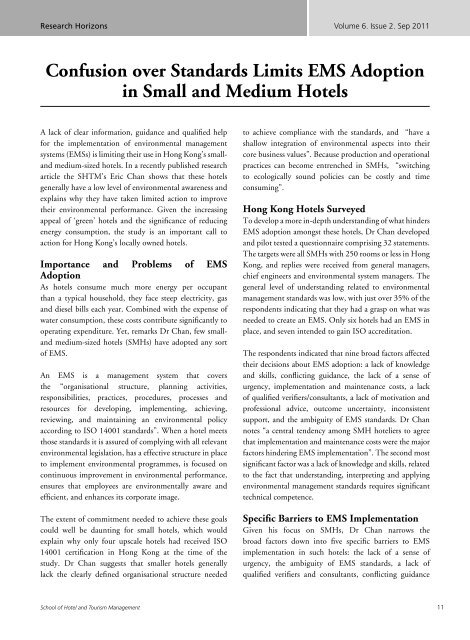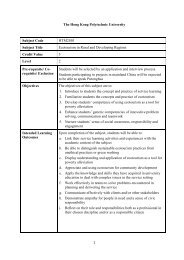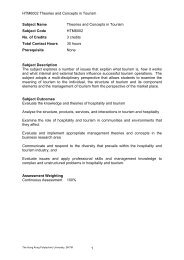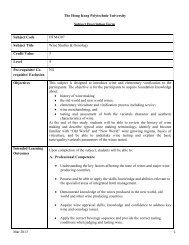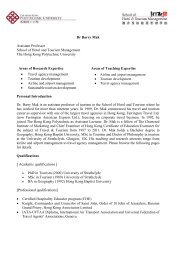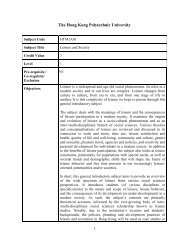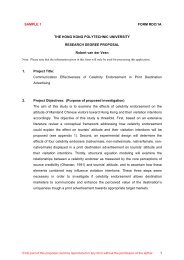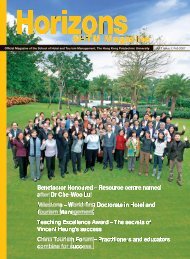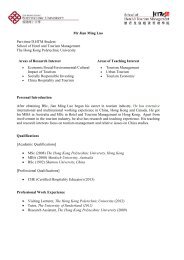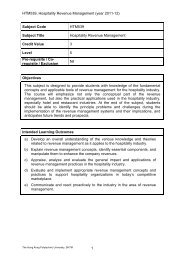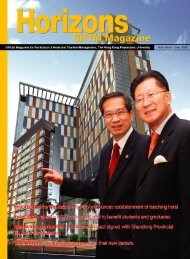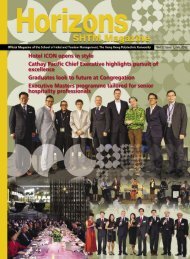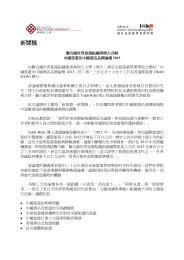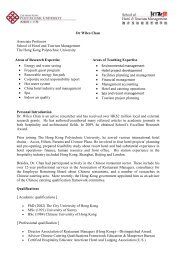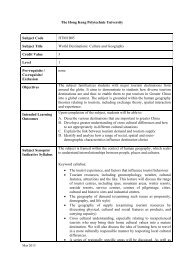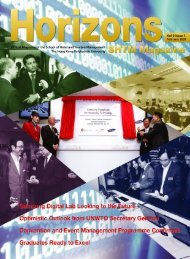Vol 11 Issue 2, September 2011 - School of Hotel & Tourism ...
Vol 11 Issue 2, September 2011 - School of Hotel & Tourism ...
Vol 11 Issue 2, September 2011 - School of Hotel & Tourism ...
You also want an ePaper? Increase the reach of your titles
YUMPU automatically turns print PDFs into web optimized ePapers that Google loves.
Research Horizons <strong>Vol</strong>ume 6. <strong>Issue</strong> 2. Sep 20<strong>11</strong>Confusion over Standards Limits EMS Adoptionin Small and Medium <strong>Hotel</strong>sA lack <strong>of</strong> clear information, guidance and qualified helpfor the implementation <strong>of</strong> environmental managementsystems (EMSs) is limiting their use in Hong Kong’s smallandmedium-sized hotels. In a recently published researcharticle the SHTM’s Eric Chan shows that these hotelsgenerally have a low level <strong>of</strong> environmental awareness andexplains why they have taken limited action to improvetheir environmental performance. Given the increasingappeal <strong>of</strong> ‘green’ hotels and the significance <strong>of</strong> reducingenergy consumption, the study is an important call toaction for Hong Kong’s locally owned hotels.Importance and Problems <strong>of</strong> EMSAdoptionAs hotels consume much more energy per occupantthan a typical household, they face steep electricity, gasand diesel bills each year. Combined with the expense <strong>of</strong>water consumption, these costs contribute significantly tooperating expenditure. Yet, remarks Dr Chan, few smallandmedium-sized hotels (SMHs) have adopted any sort<strong>of</strong> EMS.An EMS is a management system that coversthe “organisational structure, planning activities,responsibilities, practices, procedures, processes andresources for developing, implementing, achieving,reviewing, and maintaining an environmental policyaccording to ISO 14001 standards”. When a hotel meetsthose standards it is assured <strong>of</strong> complying with all relevantenvironmental legislation, has a effective structure in placeto implement environmental programmes, is focused oncontinuous improvement in environmental performance,ensures that employees are environmentally aware andefficient, and enhances its corporate image.The extent <strong>of</strong> commitment needed to achieve these goalscould well be daunting for small hotels, which wouldexplain why only four upscale hotels had received ISO14001 certification in Hong Kong at the time <strong>of</strong> thestudy. Dr Chan suggests that smaller hotels generallylack the clearly defined organisational structure neededto achieve compliance with the standards, and “have ashallow integration <strong>of</strong> environmental aspects into theircore business values”. Because production and operationalpractices can become entrenched in SMHs, “switchingto ecologically sound policies can be costly and timeconsuming”.Hong Kong <strong>Hotel</strong>s SurveyedTo develop a more in-depth understanding <strong>of</strong> what hindersEMS adoption amongst these hotels, Dr Chan developedand pilot tested a questionnaire comprising 32 statements.The targets were all SMHs with 250 rooms or less in HongKong, and replies were received from general managers,chief engineers and environmental system managers. Thegeneral level <strong>of</strong> understanding related to environmentalmanagement standards was low, with just over 35% <strong>of</strong> therespondents indicating that they had a grasp on what wasneeded to create an EMS. Only six hotels had an EMS inplace, and seven intended to gain ISO accreditation.The respondents indicated that nine broad factors affectedtheir decisions about EMS adoption: a lack <strong>of</strong> knowledgeand skills, conflicting guidance, the lack <strong>of</strong> a sense <strong>of</strong>urgency, implementation and maintenance costs, a lack<strong>of</strong> qualified verifiers/consultants, a lack <strong>of</strong> motivation andpr<strong>of</strong>essional advice, outcome uncertainty, inconsistentsupport, and the ambiguity <strong>of</strong> EMS standards. Dr Channotes “a central tendency among SMH hoteliers to agreethat implementation and maintenance costs were the majorfactors hindering EMS implementation”. The second mostsignificant factor was a lack <strong>of</strong> knowledge and skills, relatedto the fact that understanding, interpreting and applyingenvironmental management standards requires significanttechnical competence.Specific Barriers to EMS ImplementationGiven his focus on SMHs, Dr Chan narrows thebroad factors down into five specific barriers to EMSimplementation in such hotels: the lack <strong>of</strong> a sense <strong>of</strong>urgency, the ambiguity <strong>of</strong> EMS standards, a lack <strong>of</strong>qualified verifiers and consultants, conflicting guidance<strong>School</strong> <strong>of</strong> <strong>Hotel</strong> and <strong>Tourism</strong> Management <strong>11</strong>


